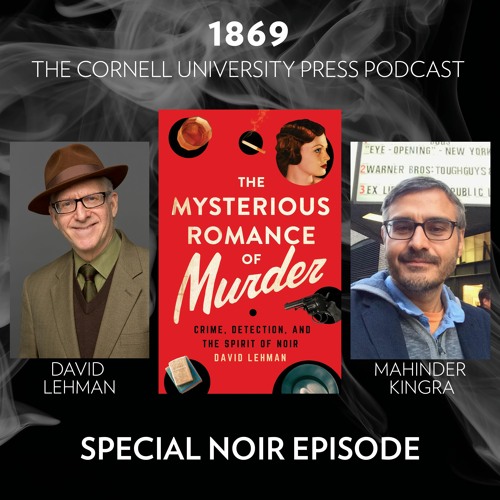
David Lehman, the insightful critic, has seen all the noir movies (multiple times) and has read the novels many of the noir movies are based on. Lehman celebrates Ida Lupino as The First Lady of Noir–his arguments convinced me. But Lehman doesn’t stop there: he expands the borders of noir.
What impressed me most was Lehman’s analysis of writers I don’t associate with noir: Rex Stout and Ed McBain. Lehman teases out noirish aspects of the Nero Wolfe series as well as the 87th Precinct novels.
Spying wraps noir around itself in the dark alleys and secret passages of le Carre, Graham Greene, and Eric Ambler. After reading Lehman’s intriguing chapters on spy craft, I wanted to drop everything and dive into the world of espionage and moles and double-dealing!
If you’re a fan of noir–movies and/or books–Lehman’s guided tour to the genre will impress and edify you. Highly recommended! GRADE: A
TABLE OF CONTENTS:
Introduction: The Mysterious Romance of Murder — 1
Part I. Killer Style
1. Cracking Wise — 45
2. Paradise of the Damned: Eighteen Notes on Noir — 52
3. Poetry Noir — 79
4. Five Noir Poems — 87
“Perfidia” –87
“Laura” — 88
“Witness to a Murder” 89
“The Formula” — 90
“Just a Couple of Mugs” — 91
Part II. The Elements of Crime
5. Here’s to Crime! — 95
6. The Last Cigarette — 103
7. Among My Souvenirs — 113
Part III. Auteurs
8. The Great British Spymasters — 125
9. The Limits of Logic: Trent’s Last Case (E. C. Bentley) — 140
10. Dashiell Hammett’s Priceless Patter — 144
11. Paperclip (Raymond Chandler) — 157
12. “Grim Grin” (Graham Greene) — 159
13. Rex Stout: The Emperor of Couronne de Canard — 161
14. Ida Lupino: The First Lady of Noir — 167
15. Black Friday (David Goodis) — 172
16. Orange Noir (Charles Willeford) — 175
17. Ed McBain: The Man from Isola — 178
18. Hitchcock’s America — 185
Part IV. Dreams That Money Can Buy
19. Straight Down the Line: Billy Wilder’s Double Indemnity (1944) — 213
20. Strangers and Mirrors: Orson Welles’s The Stranger (1946) and The Lady from Shanghai (1947) — 218
21. An Exchange of Bullets in Belfast: Carol Reed’s Odd Man Out (1947) — 222
22. Blind Accidents: John Huston’s The Asphalt Jungle (1950) — 226
23. Epitaph for a Genre: Stanley Kubrick’s The Killing (1956) — 230
24. Shadow of Evil: Robert Mitchum in Cape Fear (1962) — 234
25. A Reluctant Spy’s Conversion: William Holden in The Counterfeit Traitor (1962) — 238
26. Gangsters in Love: Sergio Leone’s Once Upon a Time in America (1984) — 242
27. Rogues’ Gallery — 246
28. Why Not New York? — 252
Part V. The Imp of the Perverse
29. Three Astrological Profiles — 259
Barbara Stanwyck (July 16) — 259
Graham Greene (October 2) — 262
Marlene Dietrich (December 27) — 266
Author’s Note — 271
Authors and Books Index — 273
Film and Television Index — 278
A book or a podcast?
Patti, the podcast is about the book published by Cornell University Press.
If Lehman is celebrating the work of Ida Lupino it’s a pretty good sign that he knows what he’s talking about. She does get a considerable amount of attention, but deserves even more.
Michael, I agree. Ida Lupino is an underrated actress.
And director. Though less underrated than underseen these years, while venerated by film students and pop-culture feminists.
Sounds good. I’ve seen all the movies listed.
Jeff, David Lehman clearly knows what he’s talking about. Of course, you do, too!
Though an interesting mixed bag, the cited movies, by me. From the brilliance of ODD MAN OUT to the relative disappointment of CAPE FEAR, despite the performances. (Though, of course, way the hell better than the misbegotten remake, probably Scorsese’s worst film I’ve seen.)
Todd, I agree with you the Scorsese remake of CAPE FEAR. Disappointing.
Podcast link: https://soundcloud.com/1869thecuppodcast/special-noir-episode